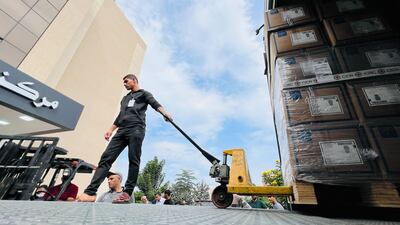Live updates: Follow the latest news on Israel-Gaza
The Gaza Strip received its two largest daily deliveries of humanitarian supplies on Sunday and Monday, bringing the total number of aid lorries to enter the enclave since humanitarian corridors were opened on October 21 to 117, the UN has said.
The increase in deliveries comes at a time when international pressure is mounting on Israel to loosen its restrictions on the entry of aid lorries through Egypt's Rafah border crossing.
Israeli inspections on its border with Egypt – at Al Awga crossing, 4km south of Rafah – have been so rigorous that fewer than 20 lorries were being allowed into Gaza each day, an Egyptian security official said.
UN officials said that about 100 aid lorries were needed every day to meet the essential needs of the 2.3 million people affected by the Gaza siege.
The Palestinian enclave used to receive between 100 and 500 aid lorries a day before the war with Israel began.
International Criminal Court prosecutor Karim Khan visited the Rafah crossing on Sunday and said impeding relief supplies to Gaza's population could constitute a crime under the tribunal’s jurisdiction.
The humanitarian situation inside Gaza has deteriorated markedly as Israel's bombardments entered their third week on Sunday, with hospitals running low on power, civilians having to resort to drinking unclean water and telecoms networks breaking down.
The US has, so far, supported the siege of Gaza, with President Joe Biden referring to Israel's bombardment as “self defence”.
However, after three weeks of intense air strikes that have claimed the lives of more than 8,000 Palestinians inside Gaza, Mr Biden “underscored the need to immediately and significantly increase the flow of humanitarian assistance to meet the needs of civilians in Gaza”, during a call with Israeli Prime Minister Benjamin Netanyahu on Sunday.
Mr Biden told Mr Netanyahu that while the US supported Israel’s right to defend itself, it would now have to do so within the bounds of international law, the White House said.
Washington's position was noticeably different from the carte blanche it gave Israel to “defend itself” against Hamas during Mr Biden's visit to Tel Aviv earlier this month, and a preceding visit by US Secretary of State Anthony Blinken.
“We will always be there by your side,” Mr Blinken said in remarks alongside Prime Minister Benjamin Netanyahu in Tel Aviv.
Israel’s enemies in the region, most prominently Iran and the militias it backs, have become more vocal in their threats of a military response against the country for its siege on Gaza.
In a social media post on X, formerly known as Twitter, Iranian President Ebrahim Raisi said the siege had “crossed red lines”.
“Washington asks us to not do anything but they keep giving widespread support to Israel,” he said on Sunday.
Israel has refused to allow fuel into Gaza since October 7, over fears that it could be used by Hamas for military purposes, it says.
This has significantly affected the delivery of aid to Gaza's civilians, most of whom are now in the southern part of the enclave, the UN said last week.
The lack of fuel will bring the enclave's healthcare infrastructure to the point of collapse and hundreds who rely on life-saving machinery inside its hospitals would also be killed, the UN warned.
Additionally, Israel has blocked humanitarian workers from entering the enclave so far, Doctors without Borders co-ordinator Marie-Aure Perreaut-Revial told The National on Sunday.
“We’re really eager to go in and support our colleagues on the ground in Gaza. We see them needing help and it’s really difficult not being able to go in,” she said.
While it has loosened its restrictions on the entry of aid, the Israeli military has, at the same time, intensified its military activities in Gaza.
After weeks of heightened tension over an imminent ground incursion, the Israeli military said it sent troops into the strip and conducted minor military activities.
Hamas, for its part, said on Sunday that it had clashed with Israeli soldiers in Gaza's north.


